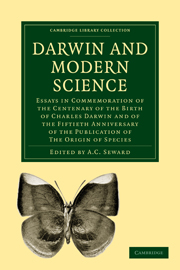 Darwin and Modern Science
Darwin and Modern Science Published online by Cambridge University Press: 07 September 2010
The idea of evolution in the organic world, made intelligible by the work of Charles Darwin, has little in common with the recent conception of change in certain types of matter. The discovery that a process of disintegration may take place in some at least of the chemical atoms, previously believed to be indestructible and unalterable, has modified our view of the physical universe, even as Darwin's scheme of the mode of evolution changed the trend of thought concerning the organic world. Both conceptions have in common the idea of change throughout extended realms of space and time, and, therefore, it is perhaps not unfitting that some account of the most recent physical discoveries should be included in the present volume.
The earliest conception of the evolution of matter is found in the speculation of the Greeks. Leucippus and Democritus imagined unchanging eternal atoms, Heracleitus held that all things were in a continual state of flux—Πáντа ῥεȋ.
But no one in the Ancient World—no one till quite modern times—could appreciate the strength of the position which the theory of the evolution of matter must carry before it wins the day. Vague speculation, even by the acute minds of philosophers, is of little use in physical science before experimental facts are available. The true problems at issue cannot even be formulated, much less solved, till the humble task of the observer and experimenter has given us a knowledge of the phenomena to be explained.
To save this book to your Kindle, first ensure no-reply@cambridge.org is added to your Approved Personal Document E-mail List under your Personal Document Settings on the Manage Your Content and Devices page of your Amazon account. Then enter the ‘name’ part of your Kindle email address below. Find out more about saving to your Kindle.
Note you can select to save to either the @free.kindle.com or @kindle.com variations. ‘@free.kindle.com’ emails are free but can only be saved to your device when it is connected to wi-fi. ‘@kindle.com’ emails can be delivered even when you are not connected to wi-fi, but note that service fees apply.
Find out more about the Kindle Personal Document Service.
To save content items to your account, please confirm that you agree to abide by our usage policies. If this is the first time you use this feature, you will be asked to authorise Cambridge Core to connect with your account. Find out more about saving content to Dropbox.
To save content items to your account, please confirm that you agree to abide by our usage policies. If this is the first time you use this feature, you will be asked to authorise Cambridge Core to connect with your account. Find out more about saving content to Google Drive.